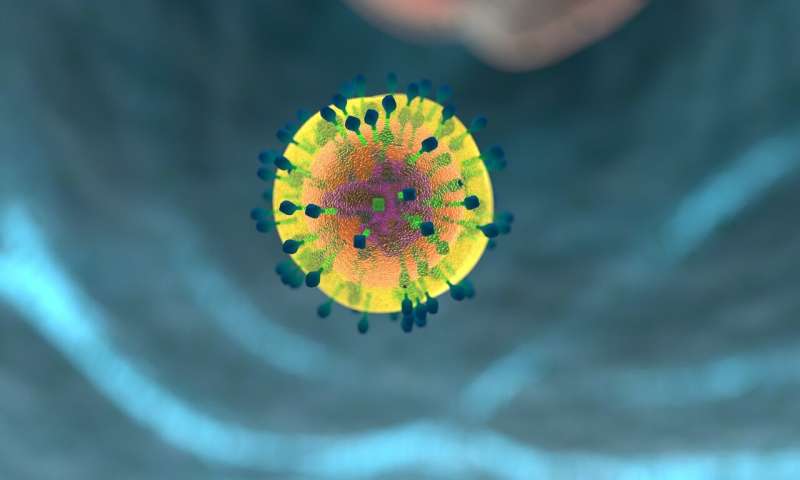This article has been reviewed according to Science X's editorial process and policies. Editors have highlighted the following attributes while ensuring the content's credibility:
fact-checked
trusted source
proofread
CAR-T cell therapy leads to long-term remission in lupus while maintaining vaccine response

New research at ACR Convergence 2023, the American College of Rheumatology's annual meeting, demonstrates that CAR-T cell therapy could lead to sustained suppression of autoantibodies in treatment-resistant lupus while maintaining a robust response to vaccines.
Systemic lupus erythematosus (SLE, lupus) is a complex autoimmune disease marked by the production of autoantibodies to nucleic acid DNA and nuclear protein autoantigens and is associated with dysfunctional B cells. It mainly affects women and is more common and severe in people who are Black, Hispanic, or Asian. Lupus can lead to a wide range of systemic problems varying in severity, including skin, kidney, lung, joints, and heart disease and complications during pregnancy.
The disease often requires life-long treatment with immunosuppressive or immunomodulatory drugs, and a considerable number of patients don't respond to them. One theoretical option for these patients is chimeric antigen receptor (CAR)-T cell therapy, which is successfully used to treat refractory blood cancers by destroying malignant cells.
"We were intrigued by the possibility that a deep B cells depletion exerted by CAR-T cells could lead to permanent eradication of the autoimmune disease," says Georg Schett, MD, a rheumatologist at the University Hospital Erlangen in Germany.
CAR-T cells are created by removing some of a patient's white blood cells, including immune system T cells, and genetically altering them in a lab to produce chimeric antigen receptors (CARs). The modifications allow the treated T cells to recognize and destroy antigens on the surface of target pathogenic cells after they are infused back into the patient.
Schett and his colleagues published the first-ever study of CAR-T therapy for lupus in 2022. The CAR-T cells were engineered to target CD19, a protein on the surface of the B cells that trigger lupus flares. At three months, all five patients in the study achieved drug-free remission, which was maintained up to a median eight months after the infusion.
The current follow-up study aimed to learn whether remission in CD19 CAR-T cell-treated patients could be sustained further and whether depleting B cells would blunt the effectiveness of vaccines, which work through B cells to drive antibody response.
The study included eight patients, one of whom was an Asian woman. None were Black or Hispanic. Patient T cells were modified using the lentiviral vector MBCART19. Lentiviral vectors are commonly used to deliver genetic material to specific cells in a lab. Between March 2021 and June 2023, each patient received a single dose of one million CD19 CAR-T cells per kilogram of body weight.
The researchers monitored disease activity in the patients for up to two years. Autoantibodies were measured at baseline, three months after CAR-T cell therapy and one to two years post infusion, using enzyme-linked immunosorbent assay (ELISA). Anti-double strand DNA was measured a second time by radioimmunoassay.
The researchers also assessed how patients responded to vaccines against measles, mumps, rubella, varicella zoster virus, Epstein-Barr, tetanus, and pneumococcus.
By June 2023, all eight patients were in remission, had an SLE disease activity (SLEDAI) score of zero and were off all immunosuppressant drugs, including glucocorticoids. Autoantibodies disappeared after CAR-T cell therapy with the exception of a single antibody in one patient and remained negative until the last follow-up, 12 to 24 months after treatment. This was in spite of the re-emergence of naïve B cells a few months after the infusion, which may have played a role in the patients' robust vaccination response.
"We were surprised by the fact that despite the recurrence of B cells, the disease remained absent," says Schett. "This outcome is the best one can expect as the presence of B cells permits immune responses against infections and vaccinations, while the disease, including disease-associated autoantibodies, does not come back."
Schett explains the apparent contradiction this way: "Some antibodies are deeply anchored in long-lived blood cells, which are CD19-negative and therefore escape CD19-targeted CAR-T cell therapy. Vaccination antibodies, such as tetanus, are a classic example. On the other hand, double-strand DNA and other antibodies in SLE seem to be based on plasmablasts, which are CD19-positive and [therefore destroyed] by CD19 CAR-T cells."
Although the study results are encouraging, CAR-T cell therapy has several serious limitations including potentially life-threatening toxicities such as cytokine release syndrome (CRS, cytokine storm) and immune effector cell-associated neurotoxicity syndrome (ICANS). There is also the cost. In the United States, a single CAR-T infusion runs anywhere from $375,000 to $425,000. These prices do not take into account associated costs, which can be considerable. If the infusion is administered in a hospital, the hospital stay may cost as much as the infusion itself.
Schett says CAR-T therapy for lupus is safer than for cancer, with fewer complications related to CRS. And he notes that though the costs of the therapy are high, they are country-dependent and may be offset by several years without the need for expensive lupus drugs. "The tipping point here depends on the drugs used and the costs for CAR-T cell treatment; maybe three to five years off drugs could suffice."
It's also important to note that CAR-T is not approved for lupus in the U.S. Still, Schett believes CAR-T treatment is a viable way forward.
"The first patients treated will soon have 1,000 disease-free and drug-free days. We hope that responses sustain and think there may be a good chance for sustained responses, as we did not observe any regeneration of disease-associated autoantibodies," he says.
More information: Abstract #0607: Georg Schett et al, CAR T Cell Therapy Leads to Long-term Abrogation of Autoimmunity in SLE Patients While Vaccination Responses Are Maintained (2023)

















